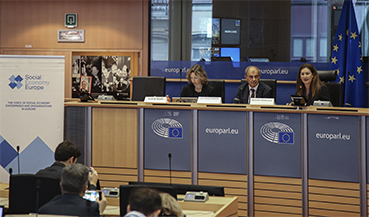The European Parliament Groups have shown their strong commitment to the Social Economy and the reactivation of the Social Economy Intergroup. This was made clearly demonstrated on October 17 in Brussels, at the event organized by MEP Maravillas Abadía from the European People’s Party Group, in coordination with Social Economy Europe, titled “The Social Economy and the EU’s Objectives 2024-2029.” The event also received the presence and support of Idoia Mendía and Irene Tinagli from the European Socialist Group, along with representatives from the European Commission’s Directorates-General for Enterprise Development and Employment.
SEE President Juan Antonio Pedreño highlighted the decisive moment that this business model: “The Social Economy can and must gain greater prominence at this moment. To achieve this, we must all work together—institutions and the Social Economy. It’s a collective effort, building public policies in favor of the Social Economy. Working together towards objectives that are at their most crucial moment.”
Among the objectives indicated by SEE’s president is the renewal of the Social Economy Intergroup in the European Parliament, whose continuity is considered “essential” for placing the Social Economy at the center of public policies. Pedreño expressed his satisfaction with the support already expressed by five political groups for the renewal of this forum and encouraged continued work at all levels: European, national, regional, and local.
In this regard, MEP Maravillas Abadía Jover stated that the Social Economy “is an essential pillar for economic development, cohesion, and competitiveness in Europe.” She added that this new legislature should continue the “good work” of the previous Social Economy Intergroup and ensure the implementation of the European Social Economy Action Plan to keep this business model at the heart of the European Union.
The second objective indicated by Pedreño was the appointment of a Commissioner with responsibilities for the Social Economy, to coordinate the deployment of the Action Plan and the industrial ecosystem of the Social Economy across all areas of activity of the different Directorates-General of the European Commission that impact the Social Economy.
This demand is supported by 19 different governments of the European Union, through the San Sebastián Manifesto (2023) and the Roadmap adopted at the European Conference in Liège earlier this year.
For Pedreño, the favorable outcome to both demands would help build an institutional architecture for the Social Economy, a model present in all economic sectors and at the forefront of the major transformations taking place in the European Union, with 4.3 million enterprises and entities and 11.5 million workers.







